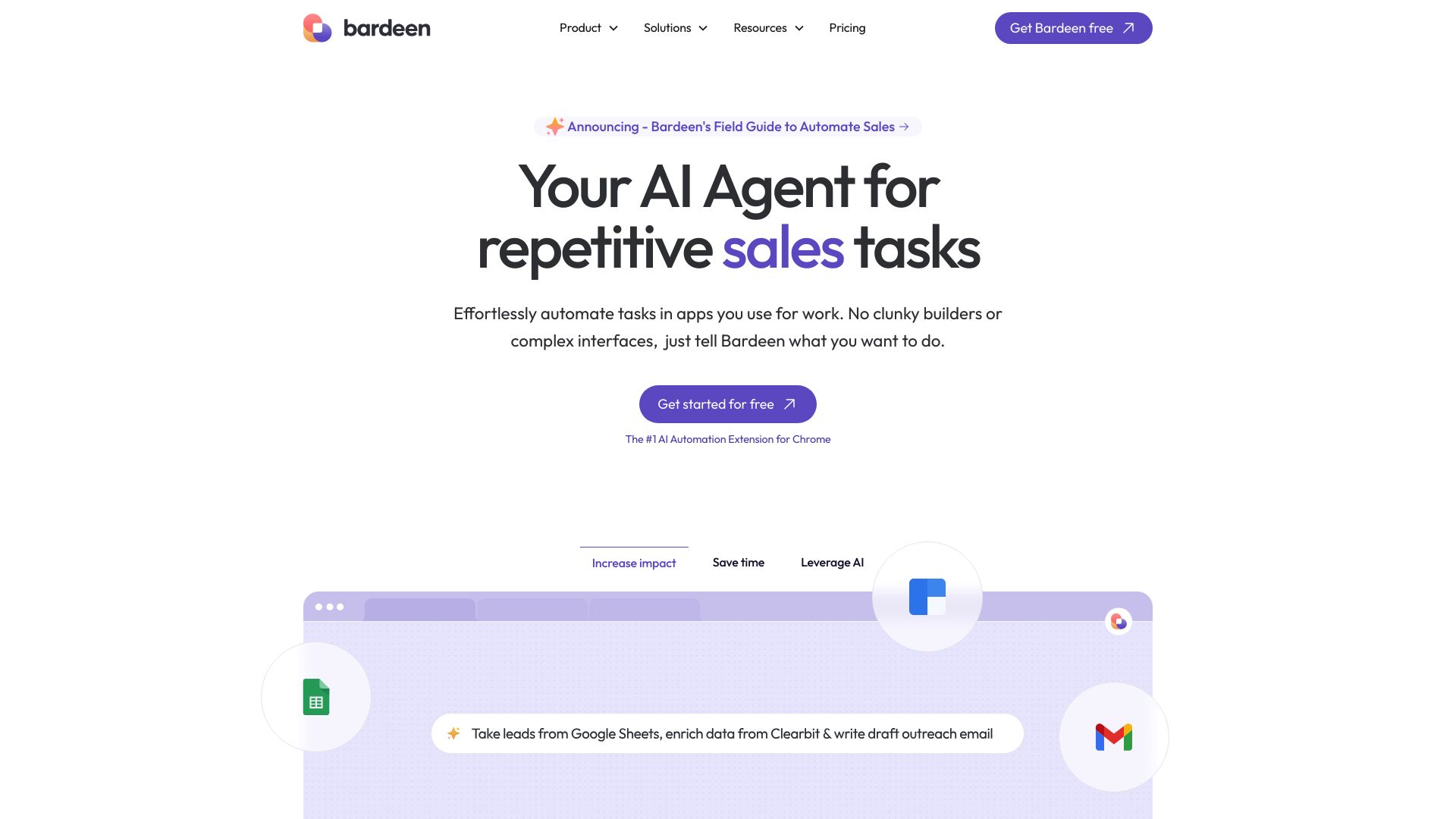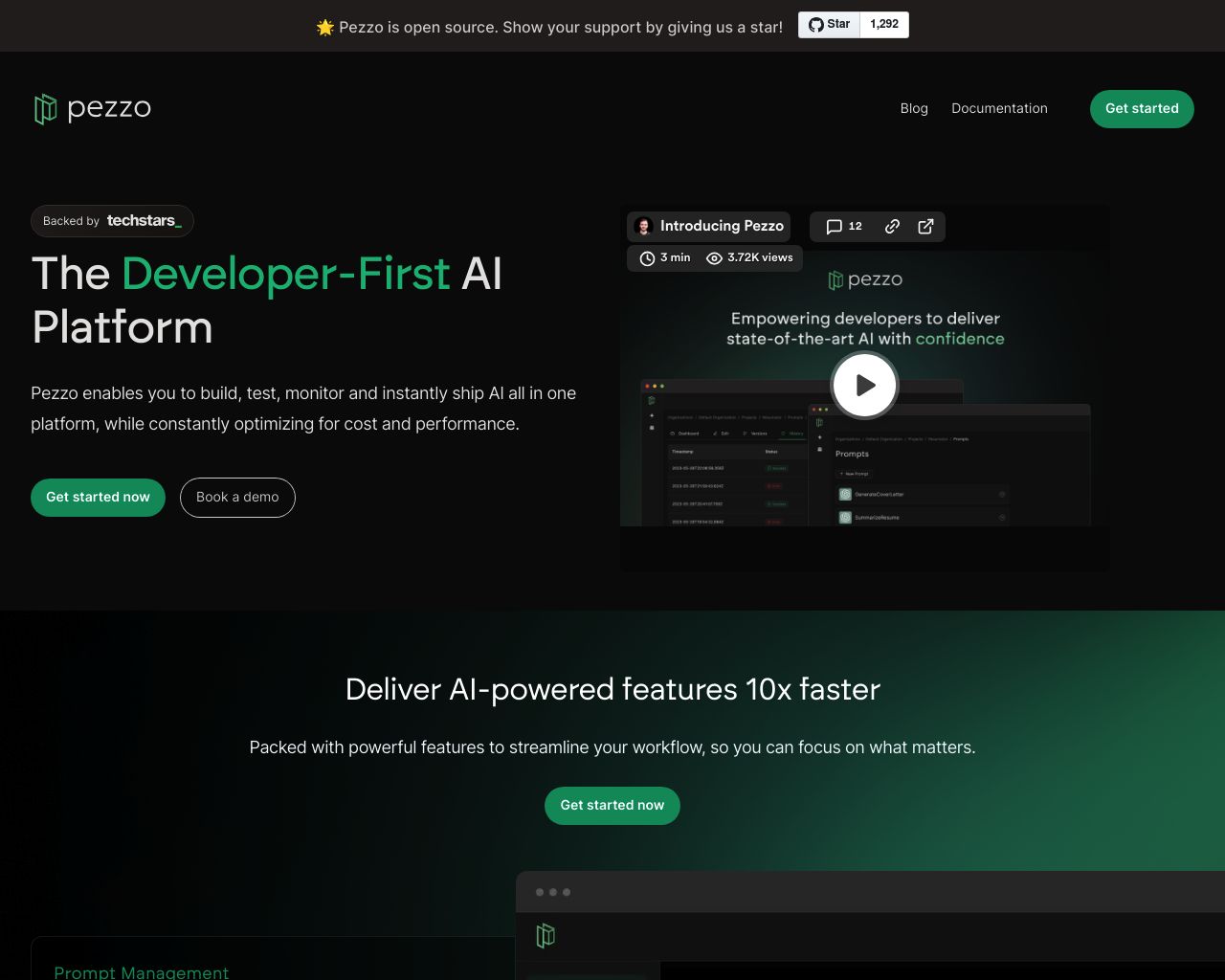Bardeen AI vs. Pezzo: Comparing AI Automation Tools
AI development and automation tools transform how businesses streamline operations and leverage advanced technologies. Bardeen AI vs. Pezzo offer distinct approaches to these challenges, each with unique strengths and limitations. Bardeen AI excels in web-based automation through a user-friendly Chrome extension, while Pezzo focuses on streamlining AI development with robust prompt management.
This comparison explores their key features, capabilities, and potential gaps, highlighting how SmythOS emerges as a comprehensive solution addressing limitations in both platforms. Whether you’re a developer seeking efficient AI integration, a business leader exploring automation options, or an AI enthusiast looking to push boundaries, this analysis provides valuable insights to guide your decision-making process.
Bardeen AI Overview
Bardeen AI revolutionizes web automation through its innovative Chrome extension platform. Users create customized workflows called Playbooks using a visual, no-code builder to automate repetitive tasks across popular web applications.


The platform shines in its ability to democratize automation. Its drag-and-drop interface empowers users of all technical backgrounds to build sophisticated workflows tailored to their specific needs. Bardeen AI integrates seamlessly with widely-used tools like Gmail, Google Sheets, and LinkedIn, expanding its utility across various business processes.
Bardeen AI revolutionizes web automation through its innovative Chrome extension platform. Users create customized workflows called Playbooks using a visual, no-code builder to automate repetitive tasks…
AI-powered features elevate Bardeen AI’s capabilities beyond simple automation. The platform incorporates advanced functionalities such as text classification, data extraction, and text generation leveraging models like GPT-3. This AI integration allows for more intelligent and adaptive automations that can handle complex tasks with greater efficiency.
Bardeen AI emphasizes human-in-the-loop interaction, allowing users to guide automations, validate data, and provide inputs when needed. This approach strikes a balance between automation efficiency and human oversight, ensuring accuracy and contextual relevance in automated processes.
While Bardeen AI excels in browser-based automation and AI-assisted workflows, it has limitations. The platform lacks features for fully autonomous agents, extensive scalability options, or advanced deployment capabilities. Its focus on web-based tasks may also limit its applicability for more complex, system-level automations. Despite these constraints, Bardeen AI remains a powerful tool for users seeking to streamline their web-based workflows with intelligent automation.
Pezzo Overview
Pezzo empowers developers to streamline AI development through efficient prompt management and deployment. This open-source toolkit tackles the challenges of integrating AI models into applications, offering a centralized platform for creating, testing, and versioning prompts.


Pezzo’s key features include instant deployments, comprehensive observability, and cost transparency. The platform supports both Node.js and Python, catering to diverse development environments. Its visual interface simplifies prompt design, while robust version control ensures smooth rollbacks when needed.
Pezzo empowers developers to streamline AI development through efficient prompt management and deployment… offering a centralized platform for creating, testing, and versioning prompts.
Developers benefit from Pezzo’s detailed execution history and performance metrics, enabling efficient troubleshooting and optimization. The platform’s emphasis on cost visibility helps teams manage resources effectively, especially when working with various AI models.
While Pezzo excels in prompt management, it lacks some features found in comprehensive AI agent builders. The platform doesn’t offer hosted agents or autonomous agent capabilities, limiting its use for complex, self-operating AI systems. Additionally, Pezzo’s focus on prompts may not fully address needs for extensive data processing or multimodal interactions.
Pezzo’s vision centers on democratizing AI development by simplifying prompt management and deployment. This approach aligns with the growing demand for accessible AI tools, potentially accelerating AI integration across various sectors. However, users seeking end-to-end AI agent development might find Pezzo’s specialized focus on prompts limiting for more diverse AI applications.
Feature Comparison
Bardeen AI and Pezzo offer distinct approaches to AI development and automation, each with their own strengths and limitations. Bardeen AI excels in web-based automation through its Chrome extension, providing a visual no-code builder for creating custom workflows called Playbooks. This platform shines in its accessibility, allowing users without coding expertise to automate repetitive tasks across popular web applications.
In contrast, Pezzo focuses on streamlining AI development through efficient prompt management and deployment. Its open-source toolkit tackles the challenges of integrating AI models into applications, offering a centralized platform for creating, testing, and versioning prompts. Pezzo’s strengths lie in its support for both Node.js and Python, catering to diverse development environments.
However, both platforms have notable feature gaps. Bardeen AI lacks capabilities for fully autonomous agents, extensive scalability options, or advanced deployment capabilities. Its focus on web-based tasks may limit its applicability for more complex, system-level automations. Pezzo, while excelling in prompt management, doesn’t offer hosted agents or autonomous agent capabilities, limiting its use for complex, self-operating AI systems. Additionally, Pezzo’s specialized focus on prompts may not fully address needs for extensive data processing or multimodal interactions. These limitations highlight the need for more comprehensive solutions in the AI development landscape.
| Bardeen AI | Pezzo | SmythOS | |
|---|---|---|---|
| CORE FEATURES | |||
| Hosted Agents (Dev, Production) | ✅ | ❌ | ✅ |
| Visual Builder | ✅ | ❌ | ✅ |
| No-Code Options | ✅ | ❌ | ✅ |
| Memory & Context | ❌ | ❌ | ✅ |
| Autonomous Agents | ❌ | ❌ | ✅ |
| Explainability & Transparency | ✅ | ❌ | ✅ |
| Debug Tools | ❌ | ✅ | ✅ |
| Multimodal | ❌ | ❌ | ✅ |
| Problem-Solving Capabilities | ❌ | ✅ | ✅ |
| Multi-Agent Collaboration | ❌ | ❌ | ✅ |
| Audit Logs for Analytics | ❌ | ✅ | ✅ |
| Agent Work Scheduler | ✅ | ❌ | ✅ |
| SECURITY | |||
| Constrained Alignment | ❌ | ❌ | ✅ |
| Data Encryption | ✅ | ❌ | ✅ |
| OAuth | ✅ | ❌ | ✅ |
| IP Control | ❌ | ❌ | ✅ |
| COMPONENTS | |||
| Foundation AIs | ❌ | ✅ | ✅ |
| Huggingface AIs | ❌ | ❌ | ✅ |
| Zapier APIs | ❌ | ❌ | ✅ |
| All other APIs, RPA | ✅ | ❌ | ✅ |
| Classifiers | ✅ | ❌ | ✅ |
| Logic | ❌ | ❌ | ✅ |
| Data Lakes | ❌ | ❌ | ✅ |
| DEPLOYMENT OPTIONS (EMBODIMENTS) | |||
| Deploy as API | ❌ | ✅ | ✅ |
| Deploy as Webhook | ❌ | ❌ | ✅ |
| Staging Domains | ❌ | ❌ | ✅ |
| Production Domains | ❌ | ✅ | ✅ |
| API Authentication (OAuth + Key) | ❌ | ✅ | ✅ |
| Deploy as Site Chat | ❌ | ❌ | ✅ |
| Deploy as Scheduled Agent | ✅ | ❌ | ✅ |
| Deploy as GPT | ❌ | ✅ | ✅ |
| DATA LAKE SUPPORT | |||
| Hosted Vector Database | ❌ | ❌ | ✅ |
| Sitemap Crawler | ❌ | ❌ | ✅ |
| YouTube Transcript Crawler | ✅ | ❌ | ✅ |
| URL Crawler | ❌ | ❌ | ✅ |
| PDF Support | ✅ | ❌ | ✅ |
| Word File Support | ❌ | ❌ | ✅ |
| TXT File Support | ❌ | ❌ | ✅ |
Best Alternative to Bardeen AI and Pezzo
SmythOS emerges as our superior alternative to Bardeen AI and Pezzo for agentic AI automation. SmythOS delivers unparalleled versatility and power through its comprehensive platform. Users benefit from intuitive visual builders and no-code options that democratize AI development without sacrificing advanced capabilities.
SmythOS excels in areas where Bardeen and Pezzo fall short, offering robust multimodal support, autonomous agent functionality, and seamless multi-agent collaboration. The platform’s extensive integration ecosystem connects to virtually any API or data source, enabling complex workflows that Bardeen and Pezzo can’t match. SmythOS provides enterprise-grade security and scalability, supporting deployments across multiple environments with features like constrained alignment and data encryption.
Unlike Bardeen’s limited web focus or Pezzo’s narrow prompt management, SmythOS empowers users to create sophisticated AI solutions for any use case — from chatbots and scheduled agents to full-fledged GPT deployments. With its unmatched feature set and flexibility, SmythOS stands out as the clear choice for organizations seeking a truly comprehensive and future-proof AI development platform.
SmythOS delivers unparalleled versatility and power through its comprehensive platform… empowering users to create sophisticated AI solutions for any use case.
Conclusion
Bardeen AI and Pezzo offer distinct approaches to AI-powered automation and development. Bardeen AI excels in web-based task automation through its Chrome extension, empowering non-technical users with a visual no-code builder. Pezzo focuses on streamlining AI development by offering robust prompt management and deployment tools for developers.
While both platforms have their strengths, they also have limitations. Bardeen AI lacks advanced deployment options and autonomous agent capabilities, restricting its use for complex, system-level automations. Pezzo, although powerful for prompt management, doesn’t provide hosted agents or support for extensive data processing, which may limit its applicability in diverse AI scenarios.
SmythOS stands out as a comprehensive solution that addresses the limitations of both Bardeen AI and Pezzo. Our platform offers a powerful drag-and-drop interface for creating sophisticated AI workflows, supports multi-agent collaboration, and provides versatile deployment options. SmythOS empowers users with autonomous agents, extensive API integrations, and robust security features, making it suitable for a wide range of applications from simple automations to complex AI systems.
For those looking to harness the full potential of AI in their workflows, we invite you to explore SmythOS. Our platform combines ease of use with advanced capabilities, allowing you to create and deploy AI agents 99% faster. Whether you’re a developer, business leader, or AI enthusiast, SmythOS provides the tools you need to innovate and transform your processes. Get started with SmythOS today and experience the future of AI-powered automation.
Last updated:
Disclaimer: The information presented in this article is for general informational purposes only and is provided as is. While we strive to keep the content up-to-date and accurate, we make no representations or warranties of any kind, express or implied, about the completeness, accuracy, reliability, suitability, or availability of the information contained in this article.
Any reliance you place on such information is strictly at your own risk. We reserve the right to make additions, deletions, or modifications to the contents of this article at any time without prior notice.
In no event will we be liable for any loss or damage including without limitation, indirect or consequential loss or damage, or any loss or damage whatsoever arising from loss of data, profits, or any other loss not specified herein arising out of, or in connection with, the use of this article.
Despite our best efforts, this article may contain oversights, errors, or omissions. If you notice any inaccuracies or have concerns about the content, please report them through our content feedback form. Your input helps us maintain the quality and reliability of our information.
